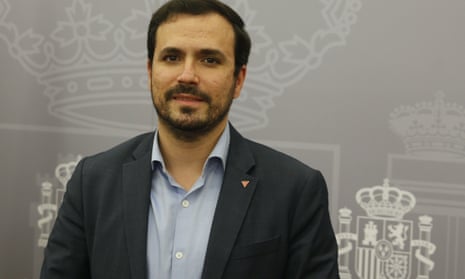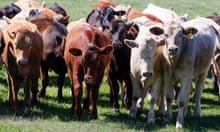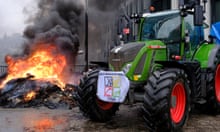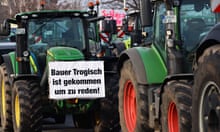Claims by a Spanish government minister that factory farming is damaging the environment and leading to the export of poor-quality meat have provoked a furious backlash after his comments were published in the Guardian.
In an interview published on Boxing Day, Alberto Garzón, the minister for consumer affairs, defended traditional grazing “as an environmentally sustainable means of cattle farming”.
“That is sustainable; what isn’t at all sustainable is these so-called mega-farms,” he said. “They find a village in a depopulated bit of Spain and put in 4,000, or 5,000 or 10,000 head of cattle. They pollute the soil, they pollute the water and then they export this poor-quality meat from these ill-treated animals.”
Garzón is the coordinator of the United Left party, a junior member of the coalition government led by the prime minister, Pedro Sánchez’s, centre-left Socialist Workers party (PSOE).
His remarks have provoked outrage from the meat industry, opposition politicians and from senior members of the PSOE, forcing the government to distance itself from his comments.
Isabel Rodríguez, the government spokesperson, said Garzón was speaking in a personal capacity. She added that the livestock industry was “an absolute priority” for the government and praised the “extremely high quality” of its produce.
Far from contrite, Garzón rejected the claim that he was speaking on his own behalf. “What I said, I said as the minister of consumer affairs. There’s no other way of seeing it,” he said a radio interview with Cadena Ser, adding that his comments were “flawless”.
“I’m not saying anything new,” he told the station. “I’m just relaying what scientists say. Everyone knows that the factory farming of meat causes pollution … and emits greenhouse gases. Europe has brought a case against Spain over the excessive level of nitrate pollution.”
Garzón also pointed out that while the Spanish Agency for Food Safety and Nutrition recommends people eat between 200g and 500g of meat a week, the average Spaniard consumes more than 1kg.
Pedro Barato, the president of the Asaja agricultural association, accused Garzón of irresponsible behaviour and called for his resignation. “The Spanish livestock industry depends on exports to survive,” he said. “You can’t send out this sort of message in the international press.”
Álvaro Mateos Amann, the president of the Basque veterinary association in Vizcaya, also demanded Garzón’s resignation, saying that the comments by what he called the “pseudo-minister” were another demonstration of “the poor quality of our political representatives and their lack of respect for the livestock sector”.
The centre-right Citizens party said in a statement that “in a single paragraph” Garzón had caused “irremediable” damage to Spain’s livestock industry, while Pablo Casado, the leader of the conservative People’s party, said it was “unacceptable that the government should tell the international press that Spain exports poor-quality meat from ill-treated animals”.
A report published in October said that intensive pork farming probably played a major role in one of Spain’s biggest environmental disasters that led to the death of thousands of fish in the Mar Menor, a saltwater lagoon in south-east Spain.
Scientists blame decades of nitrate-laden runoffs from the farms for triggering vast blooms of algae that deplete the water of oxygen, causing the fish to suffocate underwater.
According to government figures, in 2021 there were 32 million pigs in Spain, in addition to seven million cows and 15 million sheep and goats.
Garzón was previously attacked in July for urging Spaniards to reduce their meat consumption. “This doesn’t mean that we can’t have a family barbecue from time to time, just that we do it with a bit more restraint,” he said. “Eating too much meat is bad for our health and for the planet.”










